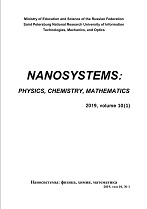|
PHYSICS
Increase of signal to reference ratio for phase compensation in continuous-variable quantum key distribution systems
Fedor M. Goncharov, Boris E. Pervushin, Boris A. Nasedkin, Roman K. Goncharov, Daniil A. Yashin, Mikhail E. Gellert, Danil V. Sulimov, Polina A. Morozova, Ilya M. Filipov, Iurii A. Adam, Vladimir V. Chistiakov, Eduard O. Samsonov, Vladimir I. Egorov
ITMO University, St. Petersburg, 197101, Russia
Аннотация:
Continuous variables quantum key distribution (CV-QKD) systems are a promising direction for quantum communications. Coherent detection, which is the basis of CV-QKD, requires taking into consideration and compensating phase distortions. Phase compensation algorithms rely on using reference pulses for phase drift estimation and correcting signal quadratures. The ratio of the number of reference pulses to that of the signal ones, affects the accuracy of the phase compensation algorithm. On the other hand, it influences the secure key rate (SKR). The paper considers the effect of the reference to signal ratio on the SKR, and proposes a modification of the phase compensation algorithm, which allows using a smaller number of references at a pulse repetition frequency close to that of the system phase noise, which results in increasing SKR. We also propose a method for estimating the phase noise in the system for selection of the optimal signal to reference ratio.
Ключевые слова:
continuous-variable quantum key distribution, quantum communications, phase noise, phase compensation, algorithm.
Поступила в редакцию: 22.11.2022
Исправленный вариант: 03.12.2022
Принята в печать: 12.12.2023
Образец цитирования:
Fedor M. Goncharov, Boris E. Pervushin, Boris A. Nasedkin, Roman K. Goncharov, Daniil A. Yashin, Mikhail E. Gellert, Danil V. Sulimov, Polina A. Morozova, Ilya M. Filipov, Iurii A. Adam, Vladimir V. Chistiakov, Eduard O. Samsonov, Vladimir I. Egorov, “Increase of signal to reference ratio for phase compensation in continuous-variable quantum key distribution systems”, Наносистемы: физика, химия, математика, 14:1 (2023), 59–68
Образцы ссылок на эту страницу:
https://www.mathnet.ru/rus/nano1162 https://www.mathnet.ru/rus/nano/v14/i1/p59
|

| Статистика просмотров: |
| Страница аннотации: | 22 | | PDF полного текста: | 7 |
|




 Обратная связь:
Обратная связь: Пользовательское соглашение
Пользовательское соглашение
 Регистрация посетителей портала
Регистрация посетителей портала Логотипы
Логотипы








 Цитирование в формате
Цитирование в формате 